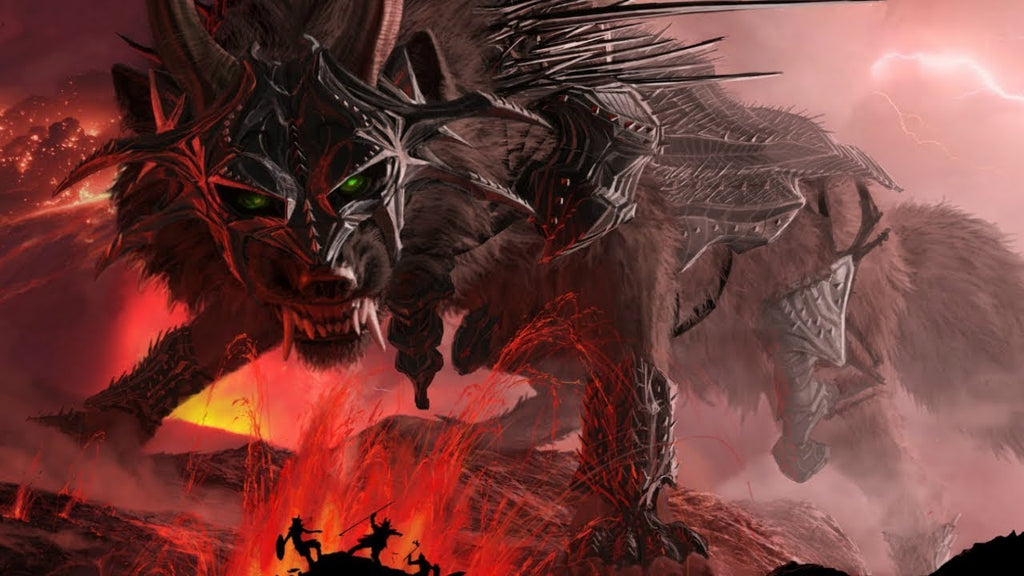5 Figures You Call Gods Aren't Gods in Norse Myth
It was true that there were many gods in Norse Pantheon. But some of those you are considering as gods are not gods from the Pantheon. To kick off studying Norse mythology, first, we have to recognize who are gods and who are the giants the enemies of gods.
Fenrir
Fenrir was the son of Loki and the giantess Angrboda. We might call him god of destruction but he was never a god. He was a giant which was from the anti-god tribe. Because he triggered off Ragnarok Doom of Gods and swallowed Odin the Allfather, he was mistaken as the god of destruction.

Fenrir the Wolf was among the most powerful figures in Norse mythology
Loki
Many people call Loki god of fire. According to the scholars, they accept to call Loki the embodiment of fire only. But Loki was never a god in Norse mythology and in Viking belief.
Even if he could live among the Norse gods, he was only a temporary dweller in Asgard. The archaeologists are yet to find any archaeological evidence supporting the cult of Loki in the Viking Age while they found cults of Thor and Odin.
Norse sources mentioned that Loki came from Jotunheim the land of the giant, foes of gods. This cemented the point that Loki was more likely to be a giant than a god.

The archaeologists are yet to find out any cult of Loki in the Viking Age which cements the point that Loki was not a god in Norse mythology
Hel
Hel was never a goddess of death. She was the ruler of the deceased and the queen of the underworld. Hel was the daughter of Loki and Angrboda suggesting she was a pure giant and never a god.
Elli
Elli is considered to be the goddess of old age. But she was never a god in Norse mythology. She lived in the land of the giants, Utgard-Loki. She was just the embodiment of old age that appeared in Norse mythology once.
That was during the journey of Thor, Loki, and servants to the land of Utgard-Loki. Thor challenged anyone in the hall to step out and wrestle with him. Elli was the one who was appointed to fight Thor. The problem was that Elli was an old woman with wrinkles and white hair. She almost stumbled when walking toward Thor with a stick. The moment she threw away her stick to join the wrestling combat, she turned violent and easily threw Thor into the air. Elli won the competition.

Elli was the embodiment of old age in Norse mythology. Even Thor God of Thunder and Storm lost in the hand of Elli.
Later, the king of Utgard-Loki explained that it was because Elli was the embodiment of Old Age and no one could ever win the power of old age when it approached, even Thor the God of Thunder and Storm.
Sigyn
Sigyn was the wife of Loki and mother of Narfi and Vali. She was considered to be the goddess of fidelity. But Sigyn was a giant and never a goddess.
She appeared once in Norse mythology when she tried to save Loki from the venom of the snake that was placed just above his face as his punishment for killing Baldur the beloved son of Odin. Sigyn was the embodiment of the traditional wife who would always stay with Loki her husband.
Narfi and Vali were sons of Sigyn and Loki. And it was because of Loki that Narfi was killed by Vali. Loki was the culprit of Baldur's death that Norse gods decided to punish Loki severely. After killing Narfi, they took the entrails of his to bind Loki to the rock.

Sigyn never left Loki for what he had done even when Loki's deeds led to the death of Narfi, their son.
Of course, Sigyn loved her sons but she never abandoned her husband for what he had done. It was obviously Loki to blame for the death of Narfi. For the deed of Sigyn, many modern readers consider Sigyn the goddess of fidelity. But the truth no source of Norse mythology mentioned Sigyn as a goddess.




